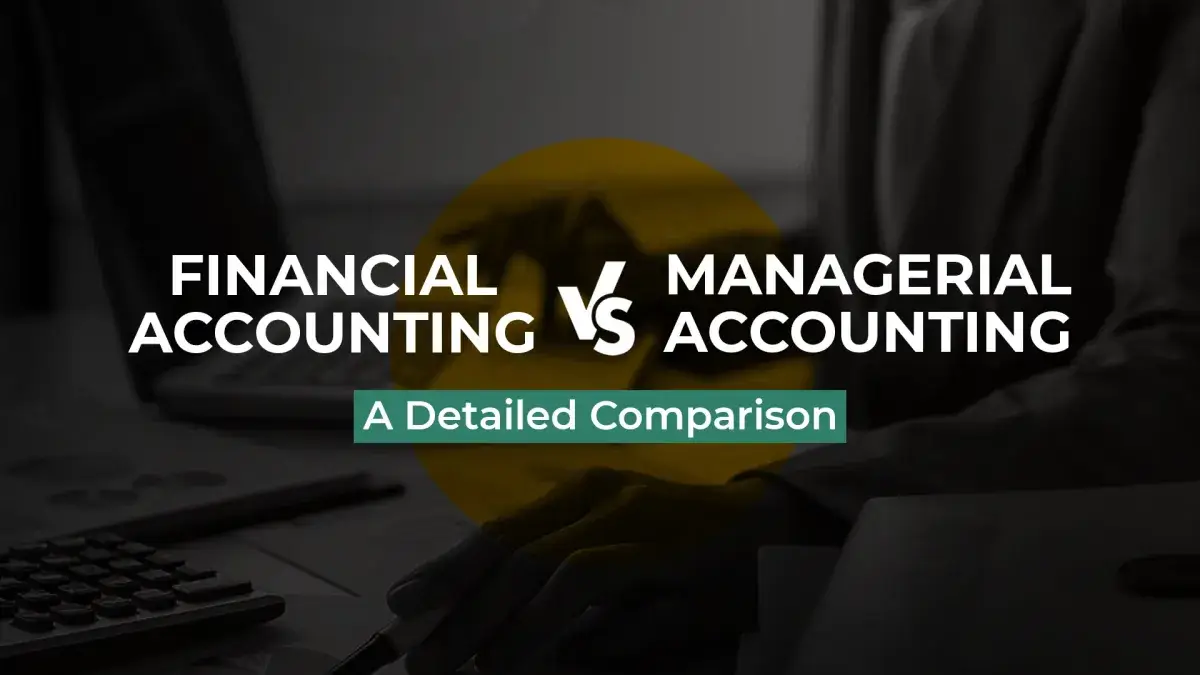Financial Accounting vs. Managerial Accounting: A Comparison

Here's What We've Covered!
Financial accounting and managerial accounting comprise the majority of accounting tasks. Given that each of these two accounting subfields represents a distinctively different career path, it is helpful to discuss the contrasts between them.
The function of an accountant is crucial to a company’s financial performance. Two of the most important subfields of accounting are financial accounting and managerial accounting. Accounting professionals who want to work in business need to understand the distinction between managerial and financial accounting.
What Is Financial Accounting
Financial accounting is used to show external stakeholders how financially sound a company is. This makes it possible for the company’s management team, stockholders, potential investors, creditors, and financial institutions to assess how the business has fared in the past throughout a particular time frame.
These reports are submitted annually. The reports are made available to the public if a corporation is thought of as a publicly listed company on the stock market. Students learn how to create, read, and evaluate financial statements in a financial accounting course.
Functions of Financial Accounting
- Recording: One cannot memorise every transaction that happens every day at a huge firm since there are so many. As a result, they must be meticulously and chronologically recorded. After that, they are processed through ledgers, journals, and other systems before being converted into final accounts.
- Validating: Accounting principles are used and recognised everywhere. Every entry in the account books that a commercial enterprise keeps gives such transactions more legitimacy and authenticity.
- Communicating: As is common knowledge, accounting is a business language used to convey data and facts to its customers.
- Interpreting: This feature allows for the accurate and transparent disclosure of an organisation’s financial situation.
How To Learn Financial Accounting
You can learn financial accounting through accounting degrees like B.com and M.com. The basics of financial accounting are taught in multiple courses. But if you want to gain in-depth knowledge of financial accounting, courses like CFA and ACCA will be the best option for you.
Interested in learning financial accounting? Checkout ACCA
These courses have a great reputation on global levels, and candidates with these qualifications have high demand in the business world. You also get to gain essential soft skills in these programs through IMS Proschool. The learning module of IMS Proschools gives importance to both practical knowledge and soft skills.
If you want to learn financial accounting, IMS Proschool’s courses are the best option.
What Is Management Accounting
Source: Freepik
Managers and directors utilise management accounting, also known as managerial accounting, to decide how to run a business on a daily basis. The fact that managerial accounting is oriented on current and upcoming trends rather than past performance sets it apart from other types of accounting.
Examples of business difficulties in the discipline of managerial accounting include figuring out how much your company should charge for a new product and estimating how much income a future product line can produce. Determining when to update the computers in your offices is also important. Management accounting must rely on forecasting markets and future trends since business leaders frequently need to make operational choices quickly.
Functions of Management Accounting
- Supplies Data: Management accounting serves as a primary source of data for management planning. The accounts, records, and reports that are presented are a data warehouse that contains a large assortment of information about the historical development of the company. For creating future forecasts, this information is quite helpful.
- Modifies data: According to the management’s needs, the financial data is compiled and categorised for the purpose of management decision-making.
- Analyses and Interprets Data: To aid in efficient planning and decision-making, accounting data is analysed in a meaningful and practical way. And in order to achieve this, statistics are presented in a comparable manner. Additionally, ratios are computed, and trends are forecast.
- Qualitative Information: In contrast to financial accounting, which focuses solely on financial data to aid management in decision-making, management accounting also includes any other information that can be valued financially to help with a better perception of the company’s performance.
How To Learn Management Accounting
Management accounting is essential for business growth. All those who want to learn management accounting also need to have an in-depth understanding of how a business runs and all other aspects of it. To learn management accounting, IMS Proschool has accounting courses like CIMA.
IMS Proschool is the certificate learning partner for multiple accounting courses. Their learning module encourages practical learning and skill development. You also get 1 on 1 mentorship from industry experts and online classes as well.
Differences Between Financial Accounting and Management Accounting
Source: Freepik
Objectives
- The primary goals of financial accounting are to make the final results of the business and its financial situation as of a specific date public.
- The basic goal of managerial accounting is to support management by supplying data for planning, setting goals, and evaluating those goals.
Format
- Financial accounts are presented in a specified manner in financial accounting in order to facilitate comparisons between various firms.
- The format in management accounting is casual and used as appropriate for each department or business.
Audience
- The information generated by financial accounting is used by third parties, including lenders and shareholders.
- Managerial accounting generates data that is used by managers and employees within a company.
Reporting Details
- Financial accounting reports frequently have an aggregated, condensed, and generalised format for a variety of reasons. Information is both less revealing and more transparent.
- Managerial accounting reports are technical, precise, and frequently experimental in nature. Companies are constantly seeking a competitive edge, so they evaluate a variety of data that may seem specialised or perplexing to outsiders.
Interested in learning managerial accounting? Checkout CIMA
Time Span
- Financial accounting mandates that financial statements be published after an accounting period has ended.
- Since managerial accounting information is most relevant, if managers can view it immediately, reports may be issued considerably more regularly.
Regulation and Uniformity
- Financial accounting reports, particularly the income statement, cash flow statement, and balance sheet, are subject to strict regulation. Companies must be extremely careful about how they conduct computations, how data are published, and in what sequence those reports are prepared because this information is made available for public consumption and is eagerly anticipated by investors.
- Only internal distribution is done for reports produced by managerial accounting. Every business is free to establish its own managerial reporting procedures and policies. Since there is no centralised method for controlling reports, finding what you need will typically take much longer.
Conclusion
The proper record-keeping of multiple corporate transactions is aided by financial accounting. Additionally, it makes it easier to compare the results of two periods for one business or between two entities.
On the other hand, management accounting is useful in analysing performance to develop the necessary strategy or create the right policies for an organisation to flourish.
FAQs
What are the similarities between financial accounting and management accounting?
- Both are elements of the fundamental accounting framework.
- The two systems monitor economic developments.
- The two seek to quantify the results of economic acts and exchanges.
- The same database is used to create reports.
- Analyse the company’s situation and performance.
What are the 4 types of accounting?
Corporate, public, governmental, and forensic accounting are the four branches. Any accounting employment typically requires a bachelor’s degree, while prior master’s work, particularly in the accounting sector, is frequently greatly encouraged. We’ll go over the specifics of each typical accounting section below.
What is the main purpose of financial accounting?
Financial accounting is used to create financial statements for businesses that reflect a specified time period. The statement of cash flow, balance sheet, and income statement are the three types of financial statements that are most frequently used.
What are the advantages of management accounting?
Making company decisions is aided by management accounting. It increases the effectiveness of the company’s operations. It aids in organising corporate operations based on forecasts and budgeting.
What is the main objective of managerial accounting?
Maximising profit and minimising losses is the main goal of managerial accounting. It is concerned with how data is presented so that financial discrepancies may be predicted and managers can make critical decisions. Its scope is very broad, and it covers many company procedures.
Resent Post
>
Best Study Abroad Courses for Commerce Graduates
>
Emerging commerce career options in India (2026): From CA to Data Analyst
>
ACCA Opportunities You Didn’t Know About – Think Beyond Audit!
>
Which Courses After 12th Commerce With High Salary Are in Demand Worldwide?
>
How to Find ACCA Jobs Online After Qualifying: Real Portals, Tips & Career Guidance
Follow Us For All Updates!





